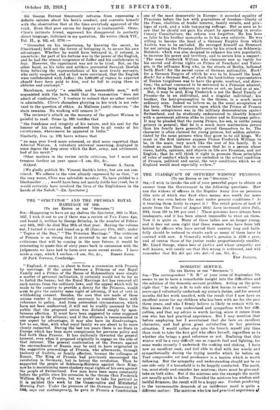THE " SPECTATOR " AND THE PRUSSIAN ROYAL MARRIAGE OF
1858.
(To THE EDITOR OF THE " SPECTATOR.") Sue.—Happening to have on my shelves the Spectator, 1851 to May, 1857, I took it out to see if there was a review of Two Years Ago, and found it, written by George Brimley, in the number of Febru- ary 14th, 1857—he died May 29th of that year. Having the volume out, I turned it over and found on p. 63 (January 17th, 1857), under " Topics of the Day," " The Prussian Marriage." The criticism of Prussia is so strong that it occurred to me that in view of criticisms that will be coming in the near future, it would be interesting to quote this of sixty years back in connexion with the judgments we have had to form over more recent events. I have made a copy, which I enclose.—I am, Sir, &c., ROBERT Jones. 13 Park Terrace, Cambridge.
"England, it seems, is about to form a connexion with Prussia by marriage. If the union between a Princess of our Royal Family and a Prince of the House of Hohenzollern were simply a matter of personal inclination, it certainly would not be for us to forbid the banns; but the Royal Marriage Act has removed all such unions from the ordinary laws, and the appeal which will be made to the country to provide a dowry for the Princess, would seem to give the country some right of advising, if not of veto in withholding consent. Besides, the uses that are made of these unions render it imperatively necessary to consider them with reference to policy. And from antecedent circumstances, which have not been unobserved, it will not be readily assumed by the public that the proposed union was dictated simply by spon- taneous affection. It must have been suggested by some supposed advantages in the alliance; and if the alliance is recommended in one aspect by advantages, it may also have its disadvantages. Let us see, then, with what royal family we are about to be more closely connected. During the last ten years there is no State in Europe which has been more conspicuous for perverse policy and bad faith than Prussia. It has uniformly thwarted the general interest, even when it proposed originally to engage on the side of that interest. The general combination of the Powers against the encroachment of Russia may be said to have originated in the suggestive proceedings of Prussia, who afterwards, through jealousy of Austria, or family affection, became the colleague of Russia. The King of Prussia had previously encouraged the revolution in Germany, but to betray the revolution. Then he supported the people of Schleswig-Holstein against their King; now he is maintaining more shadowy royal rights of his own against the people of Switzerland. Few men have been more constantly before the public since his accession to the throne tian Frederick William King of Prussia, but we prefer to take his portrait as it is painted this week by the Conservative and Ministerial Morning Post. Under the pressure of the German Democracy in 1848, says our cpntemporary, he gave to Prussia a Constitution one of the most democratic in Europe : it accorded equality of Prussians before the law with guarantees of freedom—liberty of the Pra4s, abolition of feudal tenures, family entails, and privi- leges of rank, and a wide tax-paying suffrage. But as soon as he saw that he should not gain his object by speculating in revolu- tionary Constitutions, the reform was forgotten. Ile has been as false to his brother monarchs as to his own subjects. He was willing to become the head of a German Empire from which Austria was to be excluded. He revenged himself on Denmark for not joining the Prussian Zollverein by his attack on Schleswig- Holstein; which was also designed to enhance his own popularity, to increase his power and territory, and to secure him a seaport : ' The same Frederick William who clamours now so lustily for his sacred and divine rights as Prince of Neuchatel and Valen- gin, is the self-same King who, in the streets of Berlin, bellowed forth Hoch! for the sacred cause of German nationality. Hoch! for a German Empire of which he was to be himself the head. Hoch! for a German fleet, of which the land-lubber representative of Teuton turgidness was to have the guide, usufruct, and direc- tion; the actual command to be entrusted to a Prussian admiral, ,such a thing being unknown in nature or art, on land or et sea.' - But, it may be said, King Frederick is not the Royal Family of Prussia—he is an individual, and a singular individual; his brother, the heir-presumptive to the throne, is a much more ordinary man. Indeed we believe so, in the usual acceptation of the term. The latest occasion upon which the Prince of Prussia has been conspicuous was in the military demonstration against Switzerland, and he studiously endeavoured to identify himself with a movement adverse alike to justice and to European policy. It may be pleaded that the young Prince, his son, is unlike youi princes in general; that he is a much more meritorious person than his family have generally proved themselves to be. The character is often claimed for young princes, but seldom substan- tiated by the same persons when they grow to be old kings. We must in the first instance suppose Prince Frederick William to be, in the main, very much like the rest of his family. It is indeed no more than fair to assume that he is a person whose views, habits, opinions, and objects in life are Prussian, and not English; that he will think it right to promote those principles of rules of conduct which we see embodied in the actual condition of Prussia, political and social, the very conditions which we of England would most especially eschew."


































 Previous page
Previous page